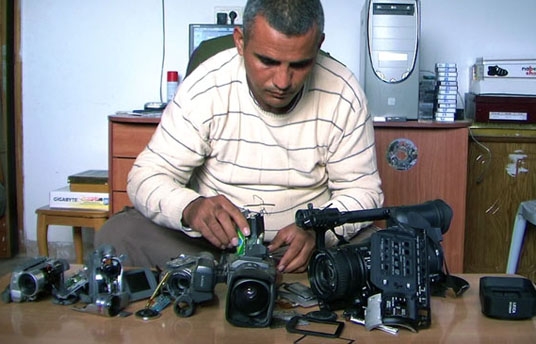Documentary Films: A Persistent Pursuit in Production, Funding and Distribution
Mar 18, 2013

Film: 5 Broken Cameras
By Shamir Allibhai, Head of Digital, Doha Film Institute
Documentaries are sometimes thought of as the lesser film. The bastard child to the big-budget silver screen. The programmes relegated to BBC TV featuring animals migrating in Africa.
I disagree.
Documentary films are a powerful genre within cinema and should be considered as equals to narratives in the world of movie making. They are the yin to the yang: if narratives often provide escapism, documentaries often bring us right into the fold of issues and topics affecting our societies.
And they have the power to change the way we think and act – if not the films themselves, then the debates they catalyse and the changes they spurn in us.
For the next two weeks, we are dedicating our digital content to this under-discussed part of film and to its heroes, the often tireless documentary filmmakers who, against all obstacles, valiantly make films while not losing sight of their mission. These are the downtrodden DIY filmmakers who don’t know how they will fund their film, where the story will end up, how they will get access to subjects: all they know is that something needs to be uncovered; a story must be told. In the best of cases, they have a view for a better, more equitable world.
We take a look at the power of social change docs that consider topics including climate change (Davis Guggenheim’s ‘An Inconvenient Truth’), the US gun epidemic (Michael Moore’s ‘Bowling for Columbine’), and the protests against the Israeli West Bank barrier (Guy Davidi’s ‘5 Broken Cameras’).
We look at the experiences of a contemporary Arab documentary maker and highlight the Top 10 Arab docs of all time (yes, it’s subjective but, like a good doc, let’s start a debate!).
For doc makers and aspiring doc makers, we’ve got a case study in how to get funding and distribution in a world that has changed quite a bit. (It used to be that the TV system was a reliable source of funding for documentaries, but their big non-fiction budgets, once earmarked for docs, have been redirected – for better or worse – to reality TV, which has been all the rage over the past decade.) Documentary makers have nevertheless adapted, buoyed by technology that allows filmmakers to gather people around a common cause – raising a small amount of money from each – at the same time creating a built-in audience, who can help spread the word.
So join us. Tell us what your favourite docs are and why. Are you a documentary filmmaker? What have been your challenges, struggles and triumphs?